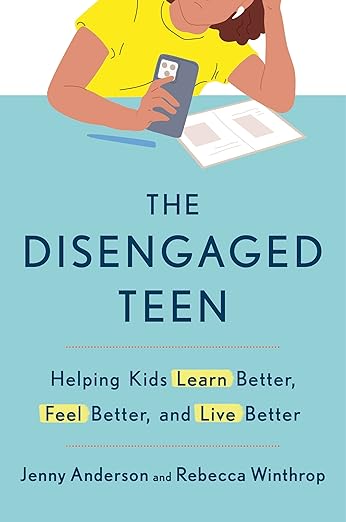At Learning Ladders, we’ve always believed that strong partnerships between home and school are the foundation of successful learning. So when we heard Jenny Anderson speak recently at a COBIS conference, we knew we had to continue the conversation.
Jenny, a former journalist at The New York Times and co-author of *The Disengaged Teen*, has spent years researching why so many students—especially high achievers—lose their love of learning. In our latest podcast, she joins our founder Matt Koster-Marcon to explore what’s going wrong, how parents can help, and what schools can do right now to re-engage students in meaningful ways.
We’ve pulled together some of the key takeaways below. But this is just a preview—the full conversation is available in the podcast at the end of this post.
The Four Modes of Student Engagement
Jenny and her co-author Rebecca Winthrop identify four “modes” that describe how students show up in school:
- Passenger – Coasting along, doing the bare minimum. Often performs okay academically, but is disengaged.
- Resistor – Actively avoids learning. These students are often misunderstood but are capable of huge growth with the right support.
- Achiever – Does everything asked, aims for top grades—but often at the cost of creativity, risk-taking and mental health.
- Explorer – The ideal. Curious, self-driven learners who find personal meaning in what they study.
It’s dynamic, not fixed—and schools play a huge role in helping students move into the more productive modes.
“Less than 4% of secondary students get the opportunity to be in explorer mode.” – Jenny Anderson
Why Even High Achievers Are Burning Out
In international schools—many of which Learning Ladders supports—achiever mode is especially common. Students excel on paper but risk burning out because they’ve learned to equate worth with results. They avoid risks and fear failure.
Jenny shared the insight that many of these students are fragile learners. What they really need is agency, autonomy, and opportunities to explore—not just another revision schedule.
How Parents Can Help (Even With Busy Lives)
The good news? Parents don’t need to be education experts to make a difference.
Simple, consistent communication—especially focused on how children are learning rather than just what—builds trust and confidence. Jenny recommends tools like targeted text messages and meaningful praise, and calls for more specific conversations about learning at home.
Learning Ladders’ platform helps schools do exactly that, making academic objectives accessible and actionable for families—without adding to teachers’ workload.
“Creating conversations about learning is exactly what schools and families need right now—and it’s what Learning Ladders is built to do.” – Matt Koster-Marcon
Practical Ideas Schools Can Try Tomorrow
Jenny and Matt discussed several simple yet powerful strategies schools are already using:
- Refocus curriculum planning with students: Share learning goals upfront and shape the ‘how’ together.
- Autonomy-supportive teaching: Give students meaningful choices and involve them in decision-making.
- Book clubs for parents: Empower families with insight and strategies in a non-threatening, inclusive format.
- Catch them being good: Use positive reinforcement to celebrate not just academic wins, but behaviours like curiosity, kindness and resilience.
These small shifts can build a stronger, more connected school culture—and more motivated learners.
Support That Works for Teachers, Students and Families
At Learning Ladders, our mission has always been to bridge the gap between school and home. We’ve built a platform that turns curriculum content into clear, accessible learning goals for parents. Our tools support student motivation, teacher autonomy, and home–school communication—backed by research and designed to fit within existing workflows.
Listen to the full podcast below to hear Jenny and Matt’s full conversation.
Want to see how Learning Ladders can help your school create meaningful conversations about learning?
